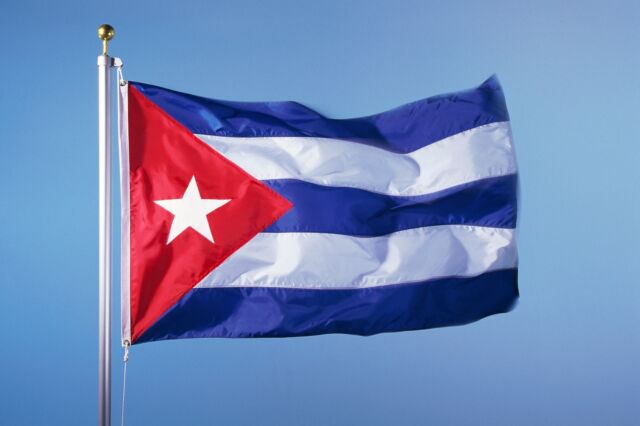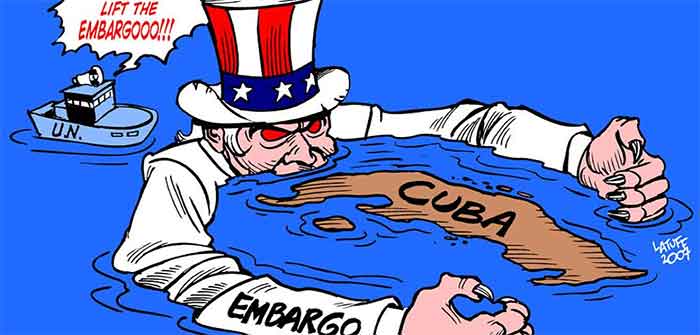
Seventy years have passed since Fidel Castro and a daring group of young Cubans launched an assault on the Moncada Barracks in eastern Cuba, aiming to topple the Fulgencio Batista dictatorship. Despite the military failure of that attempt, it served as the catalyst for the revolution that has now held power in Cuba for more than 63 years. Today, a new generation of revolutionaries is grappling with the challenges of meeting the needs of the Cuban people while fostering a socialist project within a global economy marked by crisis. They are doing all this under an intense campaign of maximum pressure from the Biden administration.
The United States’ agenda of global hegemony has continually clashed with Cuba’s pursuit of independence and sovereignty and more intensely since the revolution’s victory in 1959. The Kennedy administration initiated a blockade against Cuba in 1962, launching a relentless campaign of starvation and deprivation against the island’s 11 million inhabitants. However, despite enduring the longest embargo in modern history, Cubans have managed to build world-renowned public education and health systems, as well as an innovative biotech industry, and have secured a higher quality of life for its citizens than many developing countries.
Yet, the U.S. has intensified its blockade against Cuba over the past six years, starting with former President Donald Trump who implemented 243 new sanctions, reversing the normalization process initiated by former President Barack Obama in 2014. Despite campaign promises of a more balanced approach toward Cuba, President Joe Biden has amplified pressure on the nation.
In 2017, the U.S. accused the Cuban government of deploying sonic attacks against its embassy officials, a claim that was later proven false. However, this accusation served as a pretext to freeze relations with Cuba, causing a collapse in tourism and leading to revenue loss as more than 600,000 annual U.S. visitors ceased their travels to the island. Under Trump’s sanctions, Western Union halted operations in Cuba in 2020, disrupting remittances. Visa services were suspended by the U.S. Embassy in Havana in 2017, sparking the largest wave of irregular migration since 1980.
Cuba’s economy has suffered under this extensive blockade, with the country’s GDP shrinking to a staggering 15 percent in 2019 and 11 percent in 2020 as the government and other entities found themselves unable to purchase basic necessities due to banking restrictions imposed because of the blockade. When the COVID-19 pandemic hit in 2020, Cuba’s robust health care system was pressured by the sanctions as the number of Delta variant cases surged and the country’s only oxygen plant was rendered nonoperational due to its inability to import spare parts. Even as Cuban patients struggled to breathe, Washington refused to make exceptions, only offering U.S.-made vaccines after most Cubans had been vaccinated with domestically developed vaccines.
In his last week in office in January 2021, former President Trump put Cuba on the state sponsors of terrorism list, making it nearly impossible for Cuba to engage in normal financial transactions necessary for trade. During President Biden’s first 14 months in office, the Cuban economy lost an estimated $6.35 billion, preventing Cuba from making crucial investments in its aging energy grid or purchasing food and medicine. With the economy shrinking but the government persevering with its commitment to provide employment, inflation rocked the Cuban peso, devaluing what was already considered low government wages. While the country’s rationing system provided everyone with a subsistence diet, this was a level of deprivation that hadn’t been felt by Cubans since the Special Period in the 1990s, with no immediate solutions in sight. The Cuban government turned to alternative avenues for growth and development.
In 2020, Cuba began relying more heavily on the private sector to meet its basic needs due to the increasing scarcity of goods. With the private sector on track to import $1 billion of goods in 2023, and more than 8,000 small and medium-sized businesses having registered since 2021, the economy is slowly growing at a rate of 1.8 percent. The rise of the private sector introduces new challenges for any socialist project.
Cuban President Miguel Díaz-Canel expressed his vision for Cuba’s future, emphasizing the government’s commitment to providing essential services to its citizens but also nodding toward changes in the future. He argued that social justice is not merely about welfare or equality but also about a fair distribution of income, where those who contribute more earn more and those who are unable to contribute are assisted by the government.
In this journey, the Cuban government faces an uphill task. While the rise of the private sector has boosted supplies and provided badly needed goods, it in turn also creates new income disparities, which stands in contrast to Cuba’s historic emphasis on equitable wealth distribution. Moreover, if the government’s new policies succeed in bringing back economic growth and more efficiently delivering needed supplies via the private sector—at a time when the state is essentially blocked from doing so—it will create a new social counterweight to the state itself. This changing dynamic will define Díaz-Canel’s second and final term as president as the government manages the balance between the private sector’s growth and maintaining the socialist principles that are central to Cuba’s identity.
So far, the leadership of the Cuban Revolution, while recognizing the necessity of wealth creation, has been committed to ensuring that the benefits of this wealth are shared among all its citizens. Díaz-Canel insists that the government will safeguard the socialist project—guaranteeing essential services, some free of charge and others at the lowest possible cost—while resisting the calls from friends and foes alike to embark on any major privatization efforts.
Over the years, Cuba has faced considerable economic and political challenges. Beyond an economic blockade, natural disasters such as Hurricane Ian caused more than $1 billion in damages and left more than 100,000 families without homes. The crises provoked by the COVID-19 pandemic eliminated tourism, the country’s number one industry.
While Western governments never lose an opportunity to criticize Cuba on both economic and political grounds, many in the Global South continue to support it as an example of resilience and independence. Faced with numerous challenges, Cuba has chosen a path of resistance, continually adapting and innovating in the face of adversity rather than succumbing to external pressures.
Amid the challenges of a global economy marked by crisis, Cuba strives to maintain its socialist project, meet the needs of its people, and assert its independence. Despite facing the longest embargo in modern history, the nation has made significant strides in public education, health care, and sustainable development, outperforming many advanced economies. The future may be fraught with challenges, but Cuba’s dedication to its people and its independent path shines as a beacon of hope in a world still unable to answer the many dilemmas of humanity. Indeed, that is why Fidel Castro’s daring mission at the Moncada Barracks 70 years ago continues to have such a hold on the Cuban imagination. Despite the temporary setbacks, Cubans survive and live to fight the next battle.
Manolo De Los Santos is the co-executive director of the People’s Forum and is a researcher at Tricontinental: Institute for Social Research. He co-edited, most recently, Viviremos: Venezuela vs. Hybrid War (LeftWord Books/1804 Books, 2020) and Comrade of the Revolution: Selected Speeches of Fidel Castro (LeftWord Books/1804 Books, 2021).
This article was produced by Globetrotter.













































